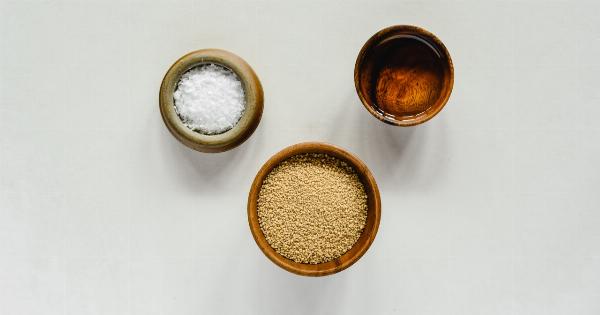Sesame oil is not just a cooking oil, but also your health’s best friend. It has been used for centuries in various traditional medicinal practices, and modern research continues to unveil its numerous health benefits.
Packed with essential nutrients and compounds, sesame oil offers a wide range of advantages when consumed or used externally on the skin and hair.
A Nutritional Powerhouse
One of the main reasons sesame oil is hailed for its health benefits is its impressive nutritional profile. It is rich in monounsaturated and polyunsaturated fats, which are considered heart-healthy fats.
These fats help reduce bad cholesterol levels and promote cardiovascular health.
Additionally, sesame oil contains omega-6 fatty acids, which play a crucial role in brain function and development. They also support the immune system and help regulate inflammation in the body.
The oil is also a good source of vitamin E, an antioxidant that protects cells from oxidative damage. It aids in skin health and may contribute to a reduction in the risk of certain chronic diseases.
Improves Heart Health
Sesame oil has long been associated with promoting heart health. Its high content of polyunsaturated and monounsaturated fats, combined with antioxidant properties, helps reduce the risk of heart diseases.
Studies have shown that sesame oil helps lower blood pressure levels, thereby reducing the strain on the heart and preventing hypertension.
Regular consumption of sesame oil has also been linked to improved lipid profiles, including decreased levels of LDL cholesterol (the “bad” cholesterol) and increased levels of HDL cholesterol (the “good” cholesterol). These effects contribute to a healthier heart and a decreased risk of heart-related complications.
Boosts Skin Health
In addition to its internal benefits, sesame oil contributes to healthy and radiant skin. It is commonly used in skincare due to its moisturizing and rejuvenating properties.
The oil is easily absorbed by the skin, making it an excellent natural moisturizer. It helps lock in moisture and prevents the skin from becoming dry or flaky.
Regular application of sesame oil can enhance skin elasticity, reduce the appearance of fine lines and wrinkles, and leave the skin supple and hydrated.
Sesame oil also possesses antioxidant properties that help protect the skin from environmental damage, such as pollution and harmful UV rays.
Its anti-inflammatory properties can soothe irritated skin, making it suitable for individuals with sensitive or inflamed skin conditions.
Strengthens Hair
Beyond its benefits for the skin, sesame oil is also used in haircare for its remarkable effects on hair health. Whether applied directly or used in hair products, sesame oil can help promote strong, lustrous hair.
The oil is rich in essential nutrients, such as vitamins, minerals, and fatty acids, which nourish the hair follicles and promote healthy hair growth.
Regular use of sesame oil on the scalp can help reduce dryness, dandruff, and itchiness, resulting in a healthier scalp environment.
Furthermore, sesame oil can help improve hair texture by providing deep conditioning and reducing frizz. It adds shine to the hair, making it appear glossy and vibrant.
With its ability to strengthen hair strands and prevent breakage, sesame oil is a natural remedy for maintaining long and strong hair.
Uses of Sesame Oil
Sesame oil is a versatile ingredient that can be incorporated into various cuisines and used for different purposes. It adds a distinct nutty flavor and aroma to dishes and works well in both savory and sweet recipes.
Here are some popular uses of sesame oil:.
1. Cooking and Flavoring
Sesame oil is commonly used in Asian cuisines, particularly in stir-fries, marinades, and dressings. It can be used as a cooking oil or added as a flavor enhancer in dishes.
Due to its low smoking point, it is best used for sautéing at medium heat or as a finishing oil.
2. Salad Dressings
Sesame oil adds depth and complexity to salad dressings. Combine it with soy sauce, vinegar, ginger, and garlic for a delicious Asian-inspired dressing. Drizzle it over salads, noodles, or vegetables for an extra burst of flavor.
3. Dipping Sauce
Create a simple and flavorful dipping sauce by mixing sesame oil with soy sauce, rice vinegar, and a touch of honey or chili flakes. It pairs well with dumplings, spring rolls, or grilled meats.
4. Aromatherapy and Massage
Sesame oil is widely used in aromatherapy and massage treatments due to its relaxing and soothing properties. It can be used as a carrier oil for essential oils or applied directly to the skin for a calming massage.
5. Oil Pulling
Sesame oil is commonly used for oil pulling, an ancient Ayurvedic practice that involves swishing oil in the mouth to improve oral hygiene and overall health.
The antibacterial properties of sesame oil help reduce harmful bacteria and promote healthier gums and teeth.
Potential Drawbacks
While sesame oil offers numerous health benefits, it is important to consume or use it in moderation. Here are some potential drawbacks to keep in mind:.
1. Allergies
Some individuals may be allergic to sesame oil. If you experience symptoms such as itching, redness, or difficulty breathing after consuming or using sesame oil, seek medical attention immediately.
2. High Calorie Content
Sesame oil is calorie-dense, so it should be consumed in moderation, especially if you are watching your calorie intake. Excessive consumption may lead to weight gain or disrupt your weight management efforts.
3. Refined vs. Unrefined
There are two types of sesame oil available: refined and unrefined. Refined sesame oil has a higher smoke point and a milder flavor, making it more suitable for cooking at higher temperatures.
Unrefined sesame oil, also known as toasted sesame oil, has a lower smoke point and a more intense flavor. It is commonly used as a finishing oil or in marinades and dressings.
4. Not Suitable for Frying
Due to its low smoke point, sesame oil is not suitable for deep frying or high-temperature cooking. Using it at higher temperatures can cause the oil to burn and release harmful compounds.
Conclusion
Sesame oil serves as an excellent companion for your overall health and well-being. It offers a wide array of benefits, ranging from improved heart health to enhanced skin and hair quality.
Incorporate sesame oil into your diet and skincare routine to enjoy its nourishing properties and experience the wonders it brings. Remember to use it in moderation and opt for the appropriate type of sesame oil depending on your culinary needs.





























